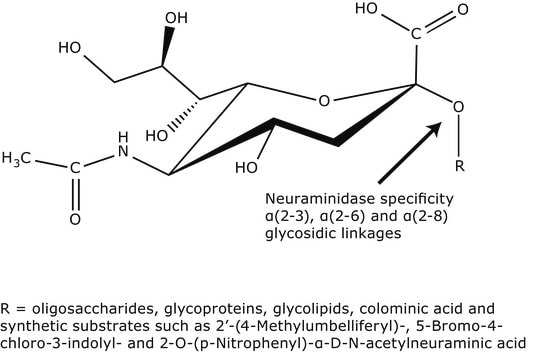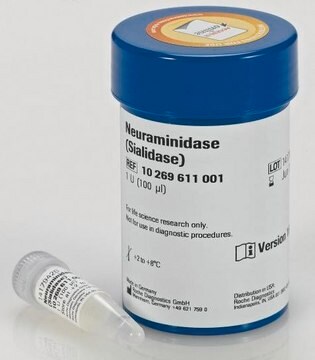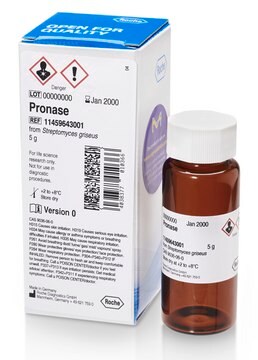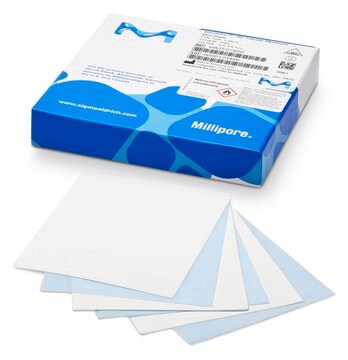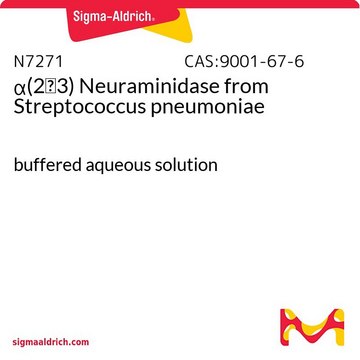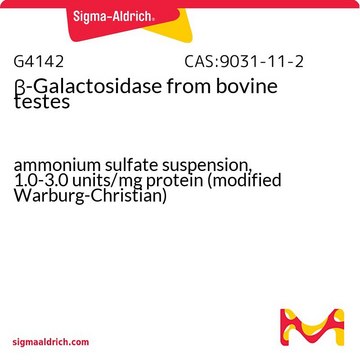11585886001
Roche
Neuraminidase (Sialidase)
from Clostridium perfringens
Sinonimo/i:
Sialidase
Autenticatiper visualizzare i prezzi riservati alla tua organizzazione & contrattuali
About This Item
Prodotti consigliati
Origine biologica
bacterial (Clostridium perfringens)
Livello qualitativo
Stato
lyophilized
Attività specifica
100 U/mg
~100 units/mg protein
PM
60 kDa
Confezionamento
pkg of 5 U
Produttore/marchio commerciale
Roche
pH ottimale
5
Condizioni di spedizione
wet ice
Temperatura di conservazione
2-8°C
Categorie correlate
Descrizione generale
approximately 100 U/mg protein at +37°C and pH 5.0 with N-acetyl-neuraminosyl-D-lactose as the substrate.
Specificità
Cleaves terminal sialic-acid residues that are α2,3-, α2,6-, or α2,8-linked to Gal, GlcNAc, GalNAc, AcNeu, GlcNeu, oligosaccharides, glycolipids, or glycoproteins. Relative rate of cleavage is α2,3 >α2,8 = α2,6, determined on bonds in tri- and tetrasaccharides.
Applicazioni
Neuraminidase (Sialidase) has been used to desialylate transferrin in order to study its isoforms in human serum.
Use Neuraminidase to hydrolyze terminal N- or 0-acylneuraminic acids which are α2,3-, α2,6-, or α2,8-linked (rate α2,3: > α2,6 = α2,8) to oligosaccharides, polysaccharides, mucopolysaccharides, glycoproteins, and glycolipids.In contrast to the enzyme from Arthrobacter ureafaciens, neuraminidase from Clostridium perfringens hydrolyzes α2,3-linkages faster than α2,6-linkages. α2,8-bound sialic acids area cleaved with a similar velocity compared to α2,6-bound sialic acids.
Neuraminidase is used for:
Neuraminidase is used for:
- Virus receptor studies
- Studies on the interaction of lymphocytes with tumor cells
- Cell hybridizations
- Analysis of oligosaccharides
- Analysis of glycoproteins
- Analysis of glycolipids
Azioni biochim/fisiol
Neuraminidase breaks α-ketosidic linkage between N-acetylneuraminic acid and the adjacent sugar residue.
Neuraminidase mediates apoptosis in the host cell before viral entry.
Nota sulla preparazione
Stabilizers: The enzyme can be stabilized by bovine serum albumin (BSA).
Storage conditions (working solution): After reconstitution in double-dist. water or sample buffer, the enzyme is stable for several weeks, stored at 2 to 8 °C; for longer storage, freezing is recommended. A stock solution may be made (e.g., at c = 5 U/100 μl). The enzyme looses approx. 50% of its activity after incubation at 37 °C for 24 hours.
Storage conditions (working solution): After reconstitution in double-dist. water or sample buffer, the enzyme is stable for several weeks, stored at 2 to 8 °C; for longer storage, freezing is recommended. A stock solution may be made (e.g., at c = 5 U/100 μl). The enzyme looses approx. 50% of its activity after incubation at 37 °C for 24 hours.
Altre note
For life science research only. Not for use in diagnostic procedures.
Codice della classe di stoccaggio
11 - Combustible Solids
Classe di pericolosità dell'acqua (WGK)
WGK 1
Punto d’infiammabilità (°F)
does not flash
Punto d’infiammabilità (°C)
does not flash
Scegli una delle versioni più recenti:
Possiedi già questo prodotto?
I documenti relativi ai prodotti acquistati recentemente sono disponibili nell’Archivio dei documenti.
I clienti hanno visto anche
Y A Shtyrya et al.
Acta naturae, 1(2), 26-32 (2009-07-01)
The structure of the influenza virus neuraminidases, the spatial organization of their active site, the mechanism of carbohydrate chains desialylation by neuraminidase, and its role in the influenza virus function at different stages of the viral infectious cycle are considered
Jesús S Aguilar Díaz de León et al.
Journal of Cancer, 12(16), 4993-5004 (2021-07-09)
Elevated concentrations of circulating low density lipoprotein (LDL) that is abnormally oxidized and desialylated is both a precursor to and a hallmark of atherosclerosis. Peripheral blood mononuclear cells (PBMCs) treated in vitro with interleukin-2 (IL-2) become lymphokine activated killer (LAK)
Ryan Septa Kurnia et al.
Veterinary world, 15(8), 1896-1905 (2022-11-01)
Clostridium toxins are widely used as medicinal agents. Many active metabolic enzymes, including sialidase (neuraminidase), hyaluronidase, and collagenase, contribute to the mechanism of action of these toxins. Sialidase from Clostridium perfringens recognizes and degrades sialic acid receptors in the host
Role of neuraminidase in influenza virus-induced apoptosis.
Morris S J, et al.
The Journal of General Virology, 80(1), 137-146 (1999)
Jitka Caslavska et al.
Journal of separation science, 40(11), 2488-2497 (2017-04-04)
Capillary electrophoresis analysis of transferrin in human serum is used to assess genetic variants after desialylation with neuraminidase and iron saturation to reduce the complexity of the transferrin pattern and thus facilitate the recognition of transferrin polymorphisms. Asialo-transferrin forms are
Il team dei nostri ricercatori vanta grande esperienza in tutte le aree della ricerca quali Life Science, scienza dei materiali, sintesi chimica, cromatografia, discipline analitiche, ecc..
Contatta l'Assistenza Tecnica.